JOHN BIRKS ‘DIZZY’ GILLESPIE
October 12
1854—Lincoln University is founded in Pennsylvania.
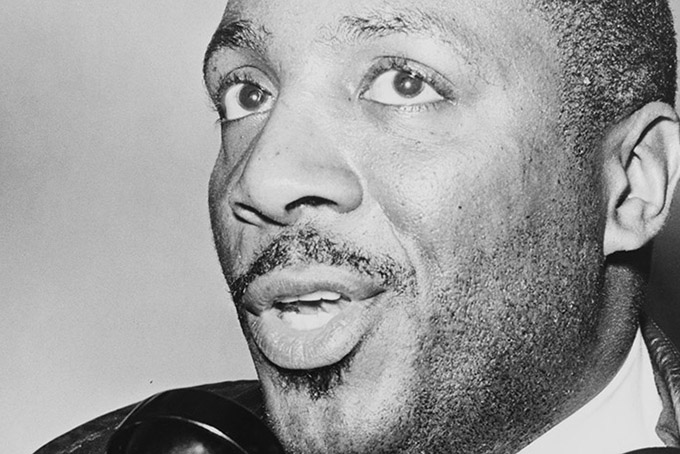
1932—Richard Claxton “Dick” Gregory is born in St Louis, Mo. Gregory is an American civil rights activist, social critic, writer, entrepreneur, conspiracy theorist and comedian.
1945—The lynching of Jesse James Payne takes place in Madison County, Fla. The lynching came to typify the lies that prompted many a lynching. Payne got into an argument with his White boss and threatened to expose some of his boss’ illegal dealings. But the boss then spread a rumor that Payne had molested his daughter and Payne was lynched.
1972—Nearly 50 Black and White sailors were injured in a race riot aboard the aircraft carrier Kitty Hawk during the Vietnam War.
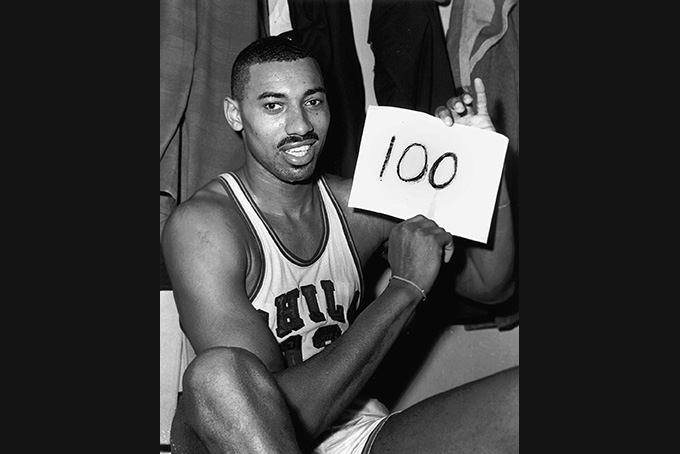
In this March 2, 1962, file photo, Wilt Chamberlain of the Philadelphia Warriors holds a sign reading “100” in the dressing room in Hershey, Pa., after he scored 100 points as the Warriors defeated the New York Knickerbockers 169-147. (AP Photo/Paul Vathis, File)
1999—Basketball legend dies at age 63. The 7’1”, 280 pound great included among his records the scoring of 100 points in one game when the Philadelphia Warriors beat the New York Knicks 169 to 147 on March 2, 1962.
October 13
1902—Arna W. Bontemps (1902-1973) is born. He was a noted poet and librarian of Fisk University in Nashville, Tenn. Bontemps frequently collaborated with another noted Black poet Langston Hughes.
1914—Garret Morgan, an African-American inventor and community leader, invents and patents the gas mask. He is renowned for a heroic rescue in 1916 in which he and three others used the mask he’d developed to save workers trapped within a water intake tunnel, 50 feet beneath Lake Erie.
1919—Whites riot in Phillips County, Ark., leaving nearly 80 Blacks lynched.
1926—Jesse Leroy Brown is born. He became the first Black naval aviator.
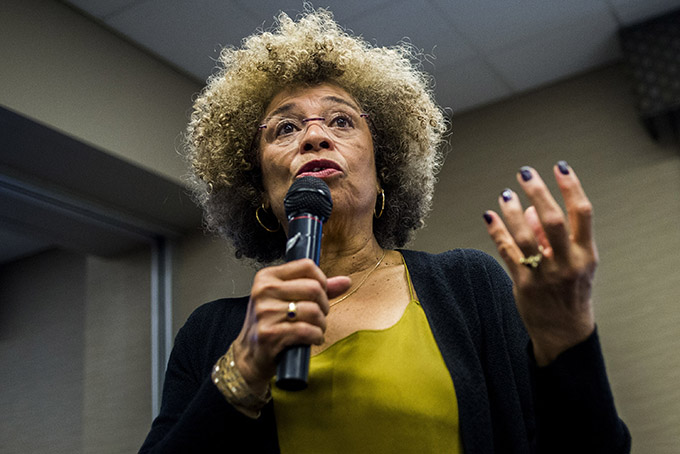
1970—Communist and activist Angela Davis is arrested as a fugitive in New York City for her alleged role in a California courthouse shootout that left four dead. She is later found not guilty.
October 14
1902—William Allison Davis is born. He earns a PhD and becomes a leading educator and anthropologist. Among his lasting legacies were his well-documented challenges to the cultural bias of IQ tests which generally portrayed Blacks as less intelligent than Whites.
1916—Washington and Lee University of Virginia refuses to play Rutgers University of New Jersey because it has a Black player on its team. That player was Paul Robeson who withdrew from the game, but later became world famous as an actor, singer and advocate of Black and socialist causes.
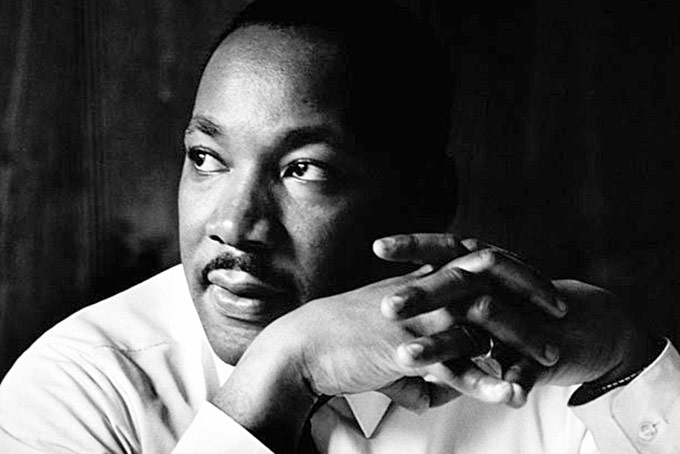
1964—Martin Luther King Jr. becomes the youngest man ever to win the Nobel Peace Prize. He was 35 and had already become world famous for his leadership of the U.S. Civil Rights Movement.
1999—Former Tanzanian President Julius Nyerere dies at 77 of cancer. He had led his country to independence and called on American Blacks to come to Africa to help rebuild the “motherland.”
October 15
1859—White minister and mystic John Brown leads a violent uprising in Harper’s Ferry, Va., in a bid to spark a Black uprising against slavery. Dozens of Whites are killed, but the revolt is eventually put down. President Abraham Lincoln once referred to him as a “misguided fanatic,” but Brown actually had a fanatical hatred of slavery and wanted it ended at all costs.
1887—The U.S. Supreme Court declares the Civil Rights Act of 1885 unconstitutional. The decision was spurred by the end of Reconstruction and helped to usher in the Jim Crow period in the South whereby Black rights won during Reconstruction were taken away.
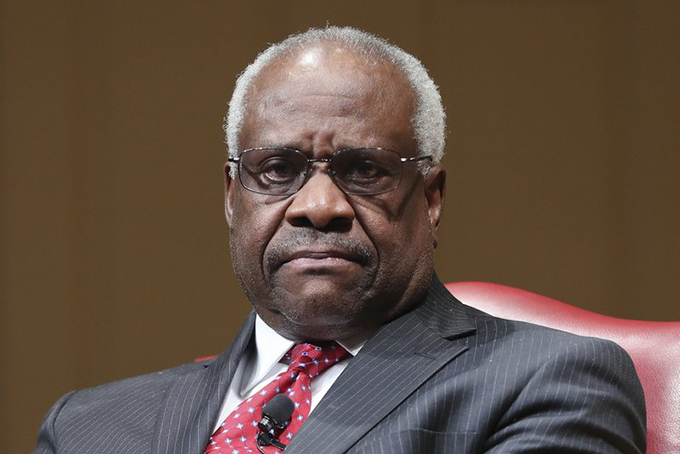
1991—Conservative Black judge Clarence Thomas is confirmed as the 106th associate justice of the U.S. Supreme. He remains on the court with a voting record, which continues to anger many Black leaders.
October 16
1849—The man considered the first Black historian in America is born. His name was George Washington Williams. He was also the first African American to serve in the Ohio legislature. He died in Blackpool, England, in August 1891.
1855—John Mercer Langston, probably the first Black elected to public office in America—wins the race for Clerk of the Brownhelm Township, Lorain County, Ohio.
1876—Race riot in Cainhoy, S.C., leaves five Whites and one Black dead.
1895—The nation’s leading African American medical group—National Medical Association—is founded in Atlanta, Ga.
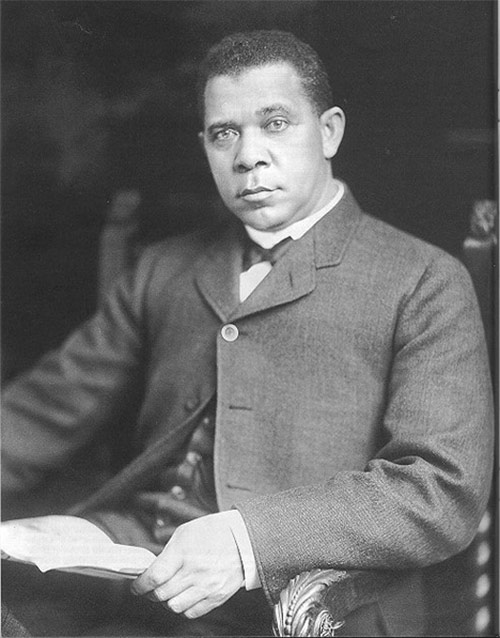
1901—Booker T. Washington becomes the first Black leader to dine at the White House with the president when Theodore Roosevelt invites him. Some Black leaders charge Washington’s invitation was a result of his policies which they charge tended to accommodate racism. Nevertheless, the invitation and dinner served to crown Washington as the Black leader of the period.
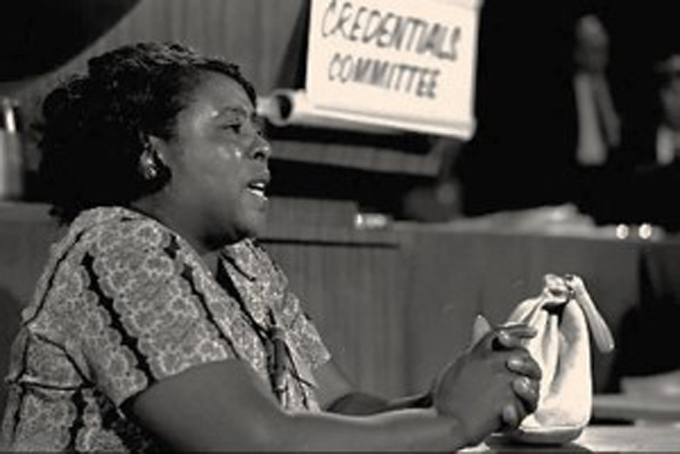
1917—One of the most unsung heroes of the Civil Rights Movement, Fannie Lou Hamer, is born in Montgomery County, Miss. Her famous and most oft-repeated quote: “I’m sick and tired of being sick and tired.”
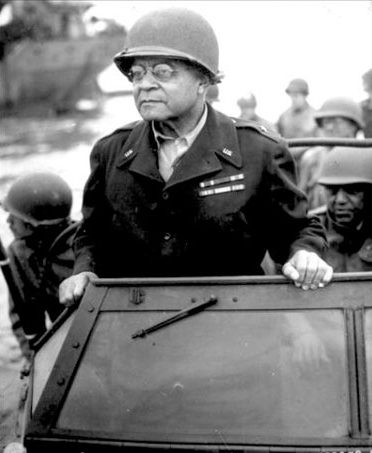
1940—Benjamin Oliver Davis Sr. is named the first Black general in the regular U.S. Army. Davis died in 1970 at the age of 90.
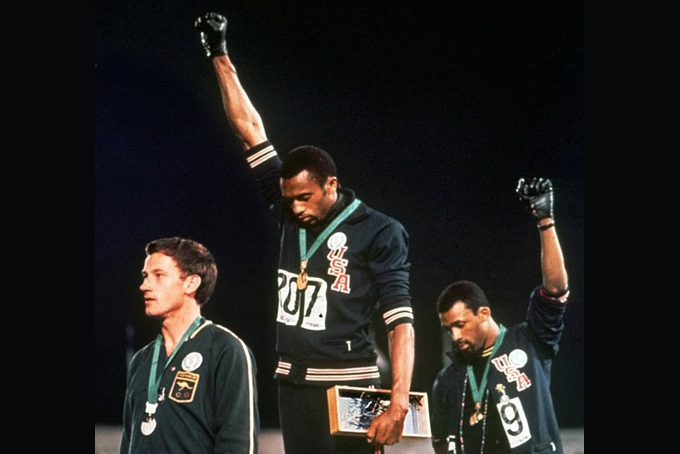
In this Oct. 16, 1968, file photo, Australian silver medalist Peter Norman, left, stands on the podium as Americans Tommie Smith, center, and John Carlos raise their gloved fists in a human rights protest. (AP Photo, File)
1968—Sprinters John Carlos and Tommie Smith give the clenched-fist Black power salute when accepting their medals at the Mexico City Olympics as a protest against racism in America. Sadly, the two sprinters would become involved in a personal dispute years later. A White Australian sprinter also wore a human rights badge in support of their protest.
1973—Maynard Jackson, elected the first Black mayor of Atlanta, Ga., dies of a heart attack while on a visit to Washington, D.C., in 2003.

1984—Bishop Desmond Tutu is awarded the Nobel Peace Prize for his work to end White minority rule in South Africa.
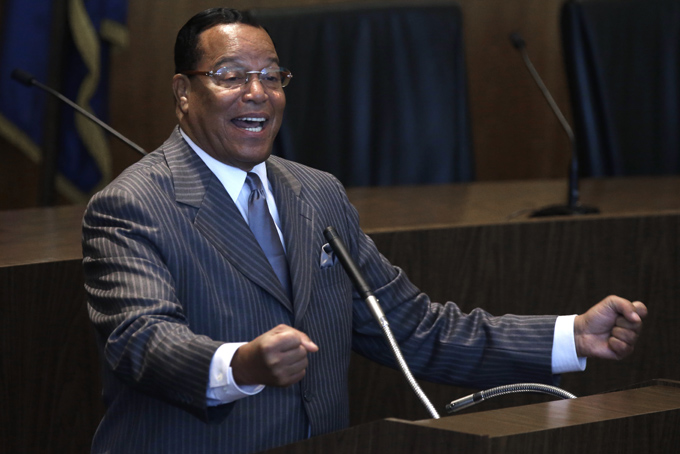
1995—Nation of Islam leader Min. Louis Farrakhan leads the Million Man March in Washington, D.C. More than a million Black men gather to “atone” and organize. No permanent organizational efforts resulted from the historic gathering.
October 17
1720—Jupiter Hammon, the first Black American poet, is born in slavery. He was a Calvinist and self-educated writer.
1787—Led by Black Mason Prince Hall, free Boston Blacks petition the Massachusetts legislature for equal school facilities for African-American children. In addition to spreading Freemasonry among Blacks, Hall became the most prominent Black leader of the period. For reasons which are not entirely clear, records show there were at least 21 men named “Prince Hall” living in Massachusetts at the time.
1871—President Ulysses Grant suspends the writ of habeas corpus in nine South Carolina counties in order to combat a Ku Klux Klan terror campaign against Blacks and some progressive Whites. Grant pretty much crushed the Klan during this period. It would not rise again until the 1920s.
1888—The nation’s first Black bank—Capital Savings—is chartered in Washington, D.C., by a group known as the Order of the True Reformers. The now little known, but once influential group set up chapters throughout the South and advocated Black self-help and the starting of Black-owned businesses. The founder was William Washington Browne—a Methodist Minister from Richmond, Va.
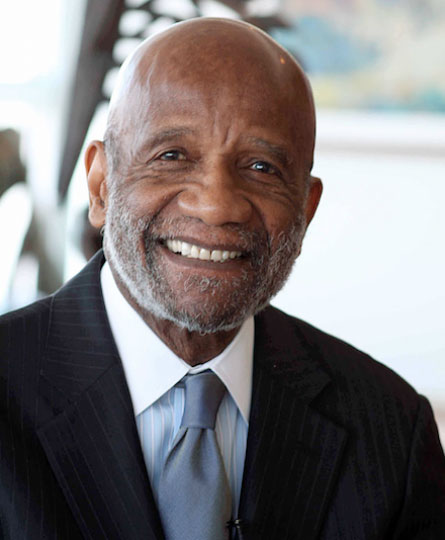
1928—Historian and Ebony magazine editor Lerone Bennett Jr. is born. His best known book is “Before the Mayflower.”
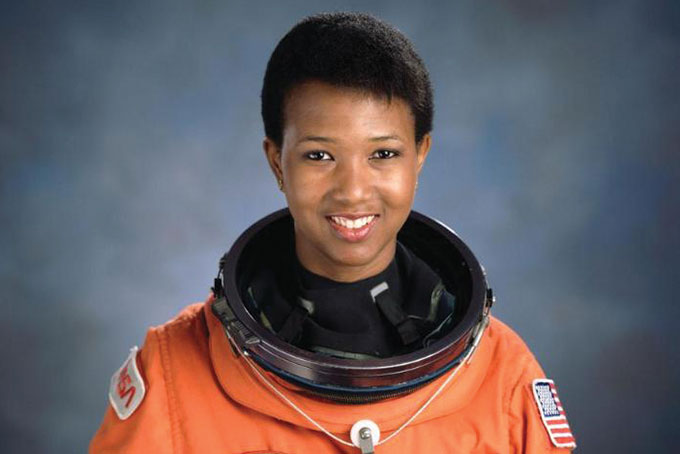
1956—Physician and astronaut Mae Jemison is born in Decatur, Ala.
1969—Dr. Clifton R. Wharton becomes the first Black in the 20th century to head a major, predominantly White university when he is named president of Michigan State University.
October 18
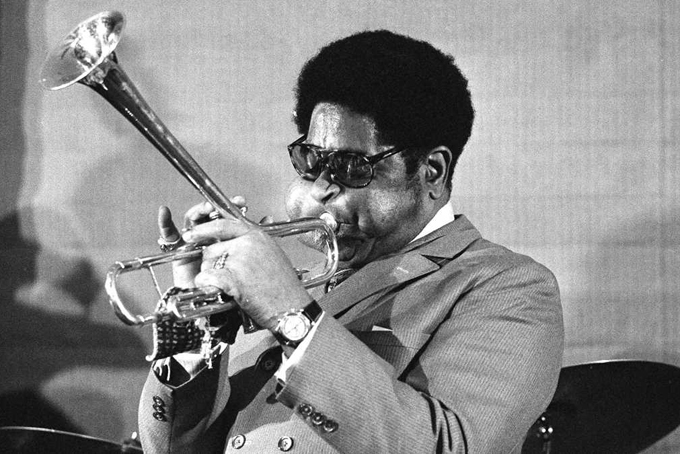
1917—“Dizzy” Gillespie, bandleader and pioneer of “B-bop Jazz,” is born John Birks Gillespie in Cheraw, S.C.
1945—Actor, singer, activist and socialist Paul Robeson receives the NAACP’s prestigious Spingarn Medal for his artistic achievements. Robeson would be hounded by the U.S. government because of his leftist leanings. He was labeled a communist, blocked from working in America and later denied a passport so he could not travel to Europe to work.

1951—Novelist Terry McMillan is born in Port Huron, Mich.